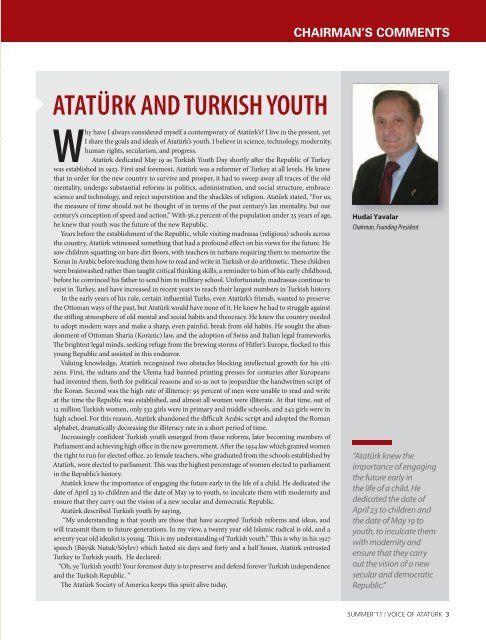Good Will Gestures in Thessaloniki - Ataturk Society of America
Good Will Gestures in Thessaloniki - Ataturk Society of America
Good Will Gestures in Thessaloniki - Ataturk Society of America
You also want an ePaper? Increase the reach of your titles
YUMPU automatically turns print PDFs into web optimized ePapers that Google loves.
atatÜRK aND tURKish YOUth<br />
W<br />
hy have I always considered myself a contemporary <strong>of</strong> Atatürk’s? I live <strong>in</strong> the present, yet<br />
I share the goals and ideals <strong>of</strong> Atatürk’s youth. I believe <strong>in</strong> science, technology, modernity,<br />
human rights, secularism, and progress.<br />
Atatürk dedicated May 19 as Turkish Youth Day shortly aft er the Republic <strong>of</strong> Turkey<br />
was established <strong>in</strong> 1923. First and foremost, Atatürk was a reformer <strong>of</strong> Turkey at all levels. He knew<br />
that <strong>in</strong> order for the new country to survive and prosper, it had to sweep away all traces <strong>of</strong> the old<br />
mentality, undergo substantial reforms <strong>in</strong> politics, adm<strong>in</strong>istration, and social structure, embrace<br />
science and technology, and reject superstition and the shackles <strong>of</strong> religion. Atatürk stated, “For us,<br />
the measure <strong>of</strong> time should not be thought <strong>of</strong> <strong>in</strong> terms <strong>of</strong> the past century’s lax mentality, but our<br />
century’s conception <strong>of</strong> speed and action.” With 56.2 percent <strong>of</strong> the population under 25 years <strong>of</strong> age,<br />
he knew that youth was the future <strong>of</strong> the new Republic.<br />
Years before the establishment <strong>of</strong> the Republic, while visit<strong>in</strong>g madrassa (religious) schools across<br />
the country, Atatürk witnessed someth<strong>in</strong>g that had a pr<strong>of</strong>ound eff ect on his views for the future. He<br />
saw children squatt<strong>in</strong>g on bare dirt fl oors, with teachers <strong>in</strong> turbans requir<strong>in</strong>g them to memorize the<br />
Koran <strong>in</strong> Arabic before teach<strong>in</strong>g them how to read and write <strong>in</strong> Turkish or do arithmetic. Th ese children<br />
were bra<strong>in</strong>washed rather than taught critical th<strong>in</strong>k<strong>in</strong>g skills, a rem<strong>in</strong>der to him <strong>of</strong> his early childhood,<br />
before he conv<strong>in</strong>ced his father to send him to military school. Unfortunately, madrassas cont<strong>in</strong>ue to<br />
exist <strong>in</strong> Turkey, and have <strong>in</strong>creased <strong>in</strong> recent years to reach their largest numbers <strong>in</strong> Turkish history.<br />
In the early years <strong>of</strong> his rule, certa<strong>in</strong> <strong>in</strong>fl uential Turks, even Atatürk’s friends, wanted to preserve<br />
the Ottoman ways <strong>of</strong> the past, but Atatürk would have none <strong>of</strong> it. He knew he had to struggle aga<strong>in</strong>st<br />
the stifl <strong>in</strong>g atmosphere <strong>of</strong> old mental and social habits and theocracy. He knew the country needed<br />
to adopt modern ways and make a sharp, even pa<strong>in</strong>ful, break from old habits. He sought the abandonment<br />
<strong>of</strong> Ottoman Sharia (Koranic) law, and the adoption <strong>of</strong> Swiss and Italian legal frameworks.<br />
Th e brightest legal m<strong>in</strong>ds, seek<strong>in</strong>g refuge from the brew<strong>in</strong>g storms <strong>of</strong> Hitler’s Europe, fl ocked to this<br />
young Republic and assisted <strong>in</strong> this endeavor.<br />
Valu<strong>in</strong>g knowledge, Atatürk recognized two obstacles block<strong>in</strong>g <strong>in</strong>tellectual growth for his citizens.<br />
First, the sultans and the Ulema had banned pr<strong>in</strong>t<strong>in</strong>g presses for centuries aft er Europeans<br />
had <strong>in</strong>vented them, both for political reasons and so as not to jeopardize the handwritten script <strong>of</strong><br />
the Koran. Second was the high rate <strong>of</strong> illiteracy: 95 percent <strong>of</strong> men were unable to read and write<br />
at the time the Republic was established, and almost all women were illiterate. At that time, out <strong>of</strong><br />
12 million Turkish women, only 532 girls were <strong>in</strong> primary and middle schools, and 242 girls were <strong>in</strong><br />
high school. For this reason, Atatürk abandoned the diffi cult Arabic script and adopted the Roman<br />
alphabet, dramatically decreas<strong>in</strong>g the illiteracy rate <strong>in</strong> a short period <strong>of</strong> time.<br />
Increas<strong>in</strong>gly confi dent Turkish youth emerged from these reforms, later becom<strong>in</strong>g members <strong>of</strong><br />
Parliament and achiev<strong>in</strong>g high <strong>of</strong>fi ce <strong>in</strong> the new government. Aft er the 1934 law which granted women<br />
the right to run for elected <strong>of</strong>fi ce, 20 female teachers, who graduated from the schools established by<br />
Atatürk, were elected to parliament. Th is was the highest percentage <strong>of</strong> women elected to parliament<br />
<strong>in</strong> the Republic’s history.<br />
Atatürk knew the importance <strong>of</strong> engag<strong>in</strong>g the future early <strong>in</strong> the life <strong>of</strong> a child. He dedicated the<br />
date <strong>of</strong> April 23 to children and the date <strong>of</strong> May 19 to youth, to <strong>in</strong>culcate them with modernity and<br />
ensure that they carry out the vision <strong>of</strong> a new secular and democratic Republic.<br />
Atatürk described Turkish youth by say<strong>in</strong>g,<br />
“My understand<strong>in</strong>g is that youth are those that have accepted Turkish reforms and ideas, and<br />
will transmit them to future generations. In my view, a twenty year old Islamic radical is old, and a<br />
seventy year old idealist is young. Th is is my understand<strong>in</strong>g <strong>of</strong> Turkish youth.” Th is is why <strong>in</strong> his 1927<br />
speech (Büyük Nutuk/Söylev) which lasted six days and forty and a half hours, Atatürk entrusted<br />
Turkey to Turkish youth. He declared:<br />
“Oh, ye Turkish youth! Your foremost duty is to preserve and defend forever Turkish <strong>in</strong>dependence<br />
and the Turkish Republic. “<br />
Th e Atatürk <strong>Society</strong> <strong>of</strong> <strong>America</strong> keeps this spirit alive today.<br />
CHAIrMAN’S COMMENtS<br />
Hudai Yavalar<br />
Chairman, Found<strong>in</strong>g President<br />
“Atatürk knew the<br />
importance <strong>of</strong> engag<strong>in</strong>g<br />
the future early <strong>in</strong><br />
the life <strong>of</strong> a child. He<br />
dedicated the date <strong>of</strong><br />
April 23 to children and<br />
the date <strong>of</strong> May 19 to<br />
youth, to <strong>in</strong>culcate them<br />
with modernity and<br />
ensure that they carry<br />
out the vision <strong>of</strong> a new<br />
secular and democratic<br />
Republic.”<br />
SUMMER’11 | VOICE OF AtAtüRk 3


